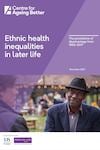A new study from researchers at the Universities of Sussex and Manchester, funded by the Nuffield Foundation, has revealed stark health inequalities between different ethnic groups that are influenced by persistent restrictions from life opportunities due to racism.
Inequalities in health become apparent from around age 30 and continue to widen as people age, becoming particularly pronounced by the time that people are in later life.
The research found that at any age after 30, people from Pakistani and Bangladeshi backgrounds experience the worst health of any ethnic group, with rates of poor health that are equivalent to those of White people at least 20 years older. For example, 22% of White British women in their 80s report poor health – the same proportion as for women from Pakistani backgrounds in their 50s (23%). And the rate of poor health for women from Bangladeshi backgrounds in their 40s (14%) is equivalent to that of White British women in their 70s (14%).
The analysis also shows that rates of poor health among men and women from Black Caribbean backgrounds are equivalent to those of White British people around ten years older. Overall, people from Pakistani backgrounds are twice as likely to report poor health than White people; for people from Bangladeshi backgrounds, the odds are 1.64 times higher, and for the Black Caribbean group the chances of reporting poor health are 1.5 times higher than for White British people.
Researchers warn that these health inequalities have persisted unchanged for almost 25 years. The Centre for Ageing Better is calling for government to put in place a national race equality strategy that addresses inequalities among older people and those approaching later life, including closing the ethnicity data gap.
As the new Office for Health Improvement and Disparities launches, government needs a clear plan for how ethnic minority older people will be supported to recover from the events of the pandemic, as this group have been disproportionately impacted by its effects. A new race equality strategy should also set out how ethnic inequalities will be tackled across the life course, to prevent them widening in later life. In addition, government should assess the potential impact on different ethnic groups of the upcoming review of the State Pension Age.


